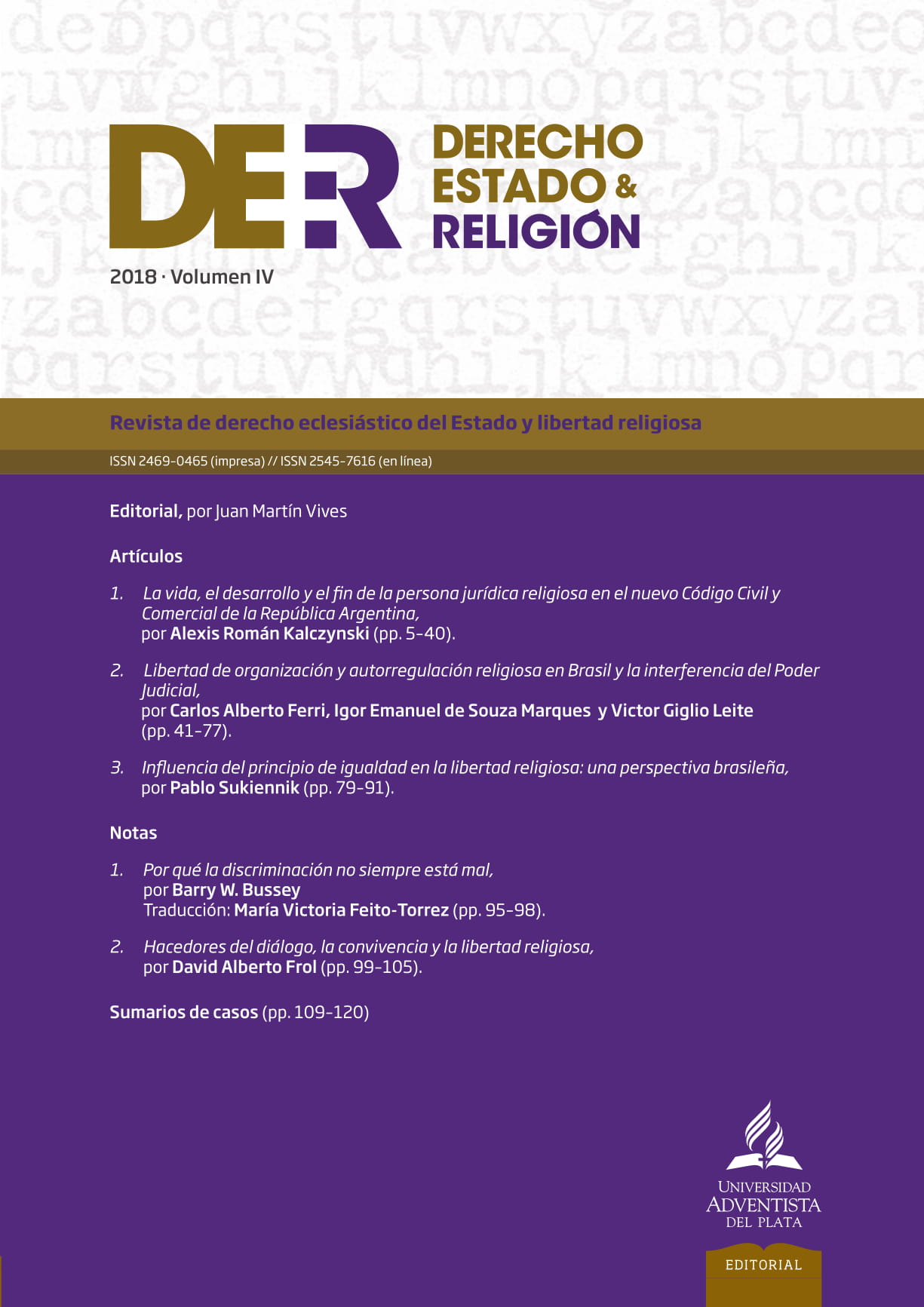Español
Abstract
The proposal of this paper is to present an introduction to the concept of the secular State in Brazil and its characteristic of neutrality in religious matters. The text addresses the position of legal principles in Brazilian law. The concept and scope of the principle of equality are also presented in abstract terms. With this information, one can understand the importance of the legal principle of isonomy for the secular State. On the other hand, the link between equality and neutrality is defended, since the latter is a development of the former. Finally, it is questioned whether in Brazil the Government can limit religious freedom under the argument of treating everyone equally.
Downloads
References
Lênio Luiz Streck, Jurisdição constitucional e hermenêutica: uma nova crítica do direito, 2.ª ed. (Porto Alegre: Livraria do Advogado, 2004), 135.
Luiz Amado Cervo, Inserção internacional: formação de conceitos brasileiros, trad. Bernardo Pablo Sukiennik Sukiennik (São Paulo: Saraiva, 2007), 63.
Ibíd.
Ibíd.
Jacint Nelson de Miranda Coutinho, Canotinho e a constituição dirigente (Rio de Janeiro: Renovar, 2003), 105-06.
Ibíd., 106.
Ruy Samuel Espíndola, Conceito De Princípios Constitucionais: Elementos Teóricos Para Uma Formulação Dogmática Constitucionalmente Adequada (São Paulo: Revista dos Tribunais, 2002), 33.2002
Cármen Lúcia Antunes Rocha, Princípios constitucionais da administração pública (Belo Horizonte: Del Rey, 1994), 29.
Ibíd., 25. A menos que se indique otra cosa, todas las traducciones pertenecen al autor de este trabajo.
Ibíd., 30.
Ibíd., 31.
Espíndola, Conceito de princípios constitucionais, 85 (énfasis del autor).
Antunes Rocha, Princípios constitucionais da administração pública, 38.
Ibíd., 39.
Ibíd., 41.
Espíndola, Conceito de princípios constitucionais, 88.
Celso Antônio Bandeira de Mello, Conteúdo jurídico do princípio da igualdade, 3.ª ed. Trad. Bernardo Pablo Sukiennik (São Paulo: Malheiros, 2005), 17. (Énfasis del autor).
Ibíd., 25.
Jorge Miranda, Manual de direito constitucional, vol. 4 (Coimbra: Coimbra Editora, 1998), 427. [énfasis del autor]
J. J. Gomes Canotilho y Machado Jônatas, “Bens culturais, propriedade privada e liberdade religiosa” Revista do Ministério Público 16, n.º 64 (1995): 29-30. (Énfasis del autor).
Jônatas Machado, “Liberdade Religiosa numa comunidade constitucional inclusiva; dos direitos da verdade aos direitos dos cidadãos”, Boletim da Faculdade de Direito da Universidade de Coimbra (1996): 176.
Texto semejante al artículo 18 del Pacto de derechos civiles y políticos que también fue ratificado por Brasil.
Bandeira de Mello, Conteúdo jurídico do princípio da igualdade, 17-18.
Aldir Guedes Soriano, “Direito à liberdade religiosa sob a perspectiva da democracia liberal”, en Direito à liberdade religiosa: desafios e perspectivas para o século XXI, ed. Valerio Mazzuoli (Belo Horizonte: Editora Fórum, 2009), 205.
Deshonrosamente, Brasil fue el penúltimo país del mundo en abolir la esclavitud, en 1888, lo que ejemplifica la tremenda lucha por la igualdad que se vive en el país y que tiene sus reflejos hasta la actualidad.
Downloads
Published
Issue
Section
License
Copyright (c) 2019 Derecho, Estado y Religión

This work is licensed under a Creative Commons Attribution-NonCommercial-ShareAlike 4.0 International License.
Authors who publish with this journal agree to the following terms:
a) Authors retain copyright and grant the journal right of first publication with the work simultaneously licensed under a Creative Commons Attribution License that allows others to share the work with an acknowledgement of the work's authorship and initial publication in this journal.
b) Authors are able to enter into separate, additional contractual arrangements for the non-exclusive distribution of the journal's published version of the work (e.g., post it to an institutional repository or publish it in a book), with an acknowledgement of its initial publication in this journal.





